The authorized know-how firm Altorney immediately introduced the final availability of MARC, a generative AI-powered doc assessment system designed to automate first-pass assessment selections earlier than paperwork enter conventional assessment platforms.
After first asserting MARC final March and going by a pilot interval with company authorized departments, the corporate is now releasing the product for basic availability to company authorized groups, litigation service suppliers and regulation corporations.
The Drawback MARC Addresses
The product tackles a core inefficiency in e-discovery workflows: organizations usually load complete doc units into costly assessment platforms, solely to cull giant parts as non-responsive. Shimmy Messing, Altorney’s CEO and co-founder, says this method creates pointless prices and safety dangers.
“If you happen to’re loading your million paperwork right into a assessment platform, for instance, after which instantly culling out 800,000 of them for not hitting key phrases or not being a part of TAR or no matter, you continue to have these 800,000 paperwork sitting there in your database that you just’re paying for and which are uncovered from a threat issue after leaving your company atmosphere,” Messing mentioned throughout an indication of the product for LawSites.
MARC’s method is to automate the culling and preliminary assessment selections earlier than paperwork attain the assessment platform, ideally throughout the group’s personal atmosphere. This implies solely related paperwork – already tagged with first-pass selections on points like privilege, confidentiality and responsiveness – are loaded into costly internet hosting platforms.
How MARC Works
MARC operates as a textual content analytics instrument that sits between information assortment and the assessment platform. The system is agnostic about which giant language mannequin (LLM) it makes use of. Organizations can deploy MARC with Altorney’s supplied Llama mannequin put in regionally, or combine it with their most well-liked authorised fashions, together with these from Azure or OpenAI.
MARC can function totally inside a company’s firewall, with no information transmitted externally. “All the info can keep there,” Messing mentioned. “Nothing has to exit to OpenAI or Azure AI – it will possibly all be contained in a neighborhood atmosphere.”
This method supplies safety whereas additionally decreasing prices, as native LLMs keep away from the per-token prices related to cloud-based AI companies.
Rachi Messing, Altorney’s co-founder, mentioned that set up usually requires simply 30-40 minutes of IT time, after which the system is essentially self-managing.
Protocol Evaluation, Not Immediate Engineering
Amongst MARC’s distinguishing options is its deliberate avoidance of requiring immediate engineering by customers.
Moderately than requiring customers to craft exact prompts – a talent Rachi Messing described as “actually laborious to grasp” and liable to inconsistency – MARC makes use of what it calls a “protocol evaluation” method.
Creating the MARC relevancy protocol from the background supplies.
With this method, customers add background supplies a few case right into a folder. These supplies would possibly embrace complaints, subpoenas, counterclaims, pleadings, and even casual paperwork like an electronic mail from in-house counsel outlining a brand new matter or an HR criticism in an inner investigation.
MARC then generates a complete protocol doc in Microsoft Phrase format. This protocol consists of:
- Identification of all events concerned.
- Related date ranges.
- An outline of the matter.
- Key people and their roles.
- Related applied sciences and merchandise.
- Totally different themes of the case.
- Particular points to determine throughout the dataset.
Attorneys can then edit this Phrase doc instantly, including lacking people, eradicating irrelevant events, narrowing overly broad themes, or adjusting different parameters.
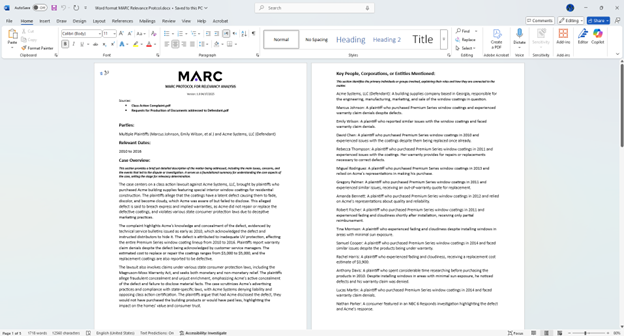
Instance of the protocol created by MARC, which the lawyer can edit and resubmit.
The edited protocol is uploaded again into MARC, which then makes use of it as the muse for all subsequent evaluation.
This method retains the workflow in acquainted territory for authorized professionals, Rachi Messing mentioned. “There’s no motive we want attorneys to turn into immediate engineers, however they love enhancing Phrase docs.”
Processing and Validation
As soon as the protocol is finalized, MARC can ingest information from a number of sources: textual content recordsdata on a file system, Microsoft Purview exports from M365, or instantly from Relativity databases. The system consists of an integration that permits customers to level MARC at particular saved searches inside Relativity with out really transferring the info.

Integration with Relativity to research docs primarily based on saved search.
MARC’s outcomes could be verified by a sampling and validation workflow. The system routinely determines the statistically legitimate pattern dimension wanted, analyzes these paperwork in accordance with the protocol, and tags them as related or not related at a low per-document value.
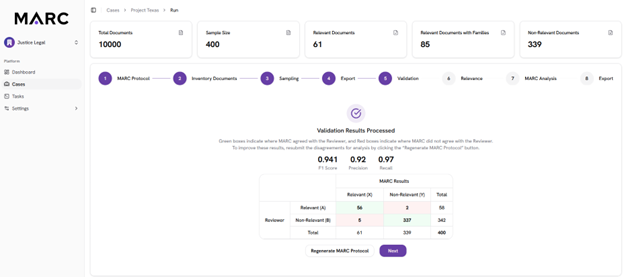
Statistical sampling and validation.
These sampled paperwork could be pushed to Relativity or exported by way of load file for lawyer assessment. As soon as attorneys validate the pattern, their selections are in contrast towards MARC’s determinations. If discrepancies exist, the system can regenerate the protocol, analyzing what wants to vary to appropriately classify the disputed paperwork with out affecting already right selections.
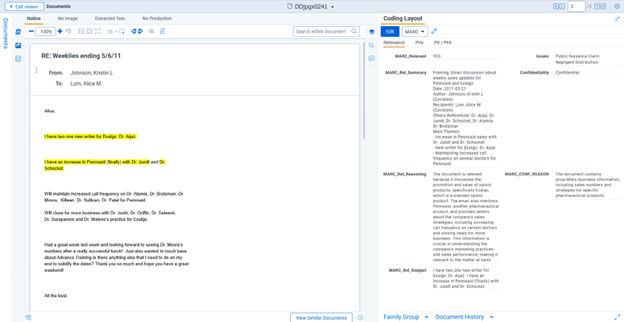
Viewing a related end in Relativity.
This iterative course of continues till the authorized workforce is happy with MARC’s efficiency. Then the complete dataset is processed, at a price of over a million paperwork per 24 hours.
Deep Evaluation Capabilities
Past easy relevance determinations, MARC can carry out a number of varieties of evaluation in a single cross, all included in a single further value. These analyses embrace:
Privilege Evaluation: MARC analyzes paperwork for attorney-client privilege and work product safety, offering reasoning for every willpower, figuring out events concerned, noting whether or not privilege was probably waived by third-party involvement, assigning confidence ranges, and routinely producing privilege descriptions appropriate for privilege logs.
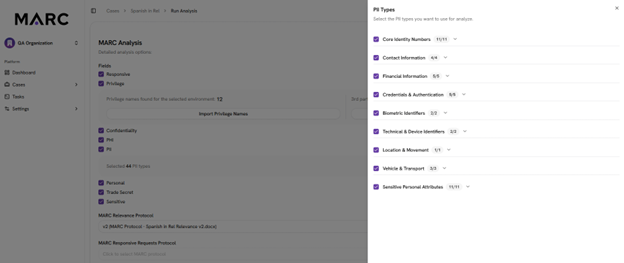
PII evaluation.
PII and PHI Detection: The system identifies personally identifiable info and guarded well being info with granular management over what varieties to flag. Customers can specify, for instance, that they solely wish to determine monetary info and well being info whereas ignoring private electronic mail addresses or cellphone numbers. MARC performs entity evaluation, associating info throughout a doc even when, as an example, an individual’s title seems on web page two and their Social Safety quantity on web page seven.
Difficulty Coding: The system can tag paperwork in accordance with case-specific points outlined within the protocol.
Confidentiality Evaluation: MARC evaluates paperwork for confidentiality designations, together with commerce secrets and techniques and different delicate enterprise info.
Sizzling Doc Identification: The system can flag probably important paperwork requiring precedence assessment.
International Language Processing: MARC routinely interprets and summarizes paperwork in overseas languages, permitting English-language protocols to research non-English paperwork and offering summaries in English for reviewers.
Output and Transparency
For each doc it processes, MARC supplies not only a resolution but additionally its reasoning. Within the demonstration, one instance confirmed MARC tagging a doc as not related. Its clarification detailed that, though the doc talked about UV safety know-how, which might probably make it related, it involved exterior paint slightly than inside window coatings, making it irrelevant to the particular case.
This transparency serves a number of functions. It permits authorized groups to know and validate the AI’s decision-making course of, supplies documentation for defensibility, and helps determine the place the system would possibly want refinement by protocol changes.
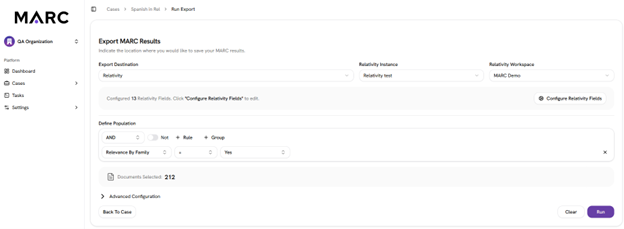
Export utilizing Relativity integration.
Paperwork are additionally enriched with summaries and, for related paperwork, snippets highlighting probably the most pertinent parts. All this info could be exported or built-in instantly again into Relativity.
Price Financial savings and Predictability
Altorney says that within the pilot program testing of MARC, customers noticed important effectivity features.
The corporate highlighted one Fortune 500 firm case involving greater than 200,000 paperwork the place MARC achieved 62% assessment value financial savings and 78% internet hosting value financial savings. The corporate claims an 80% discount in paperwork transferred to hosted assessment platforms and an 86% discount in cycle time in comparison with conventional assessment.
Its prices are additionally predictable with a excessive diploma of precision, the corporate says. In a single proof-of-concept with 30,000 paperwork, Altorney supplied the client with a finances estimate of $2,500. The precise value got here in at $2,506 – a stage of finances predictability the client’s AI workforce mentioned they’d by no means earlier than had with an AI-based product.
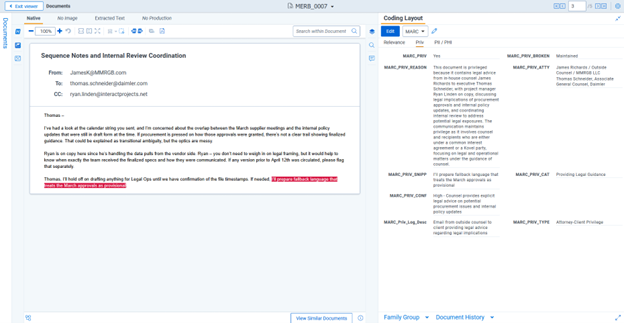
Viewing a privilege end in Relativity.
Rachi Messing emphasised that past value financial savings, the know-how addresses human inconsistency in assessment. “You give the identical doc to 4 totally different attorneys and also you’ll come out with 4 totally different selections.”
In assessments evaluating MARC’s selections to accomplished human evaluations, clients discovered that discrepancies typically revealed human reviewers had been both over broad or over slim, permitting them to tune MARC to seek out what they really wanted.
An Increasing Market
When Altorney initially launched MARC in March, it targeted solely on company authorized departments for behind-the-firewall deployment.
The reasoning for that restricted focus was each technical and strategic. The corporate believed that culling ought to occur throughout the company atmosphere earlier than information leaves for exterior assessment platforms, decreasing each prices and safety dangers.
Nonetheless, the market shortly pushed the corporate to develop its method. Some company clients expressed robust curiosity in utilizing the product however indicated that inner safety and IT approval processes might take as much as two years.
These clients requested to host MARC at their most well-liked litigation service suppliers, which might allow them to speed up deployment whereas nonetheless attaining value financial savings from diminished information volumes.
As soon as the LSPs had been on board and commenced utilizing the product, they wished to additionally be capable to use it with their regulation agency clients. That led Altorney to open the platform to regulation corporations.
“We’ve now opened it up and a number of LSPs and regulation corporations are hopping on board and have it put in of their environments as nicely,” Shimmy Messing mentioned.
Pricing Mannequin
MARC makes use of volume-based pricing with two tiers. The preliminary relevance willpower prices simply pennies per doc or much less.
Further evaluation – together with privilege, confidentiality, situation coding, PII, PHI and different determinations – can also be priced at a single per-document price of only a few cents, relying on quantity.
Notably, organizations can rerun analyses with out further prices if necessities change, reminiscent of modifications to a confidentiality order.
People within the Loop
Regardless of the automation, Altorney emphasizes that MARC is designed to maintain people concerned within the assessment course of.
“GenAI doesn’t remove the necessity for human oversight – but it surely allows the fitting human to be in the fitting place on the proper time to optimize their worth,” mentioned Stephen Goldstein, the corporate’s chief product officer.
Moderately than changing human reviewers totally, Altorney’s imaginative and prescient for MARC is to rework first-pass assessment into high quality management assessment, permitting reviewers to then work two to a few occasions sooner on a smaller set of extra vital paperwork.
Shimmy Messing acknowledged that whereas some customers would possibly finally really feel snug producing paperwork straight from MARC with out human assessment, most presently favor having “eyes on every part,” utilizing MARC’s determinations to speed up slightly than change human judgment.
‘The Final Fact Seeker’
Altorney was based by brothers Shimmy and Rachi Messing in late 2021. The corporate initially targeted on its Altorney platform, a market for doc reviewers and authorized expertise, which launched at Legalweek in 2022.
MARC emerged from a collaboration with Goldstein, now the chief product officer and previously world director of apply help at Squire Patton Boggs. Final 12 months, he approached the Messings with work he’d been doing on utilizing gen AI for first-pass assessment.
After evaluating his know-how, they determined to productize it, spending the latter half of 2024 and early 2025 growing MARC right into a business product.
The product title honors the founders’ late father, Marc Messing, an lawyer, rabbi and educator who died of pancreatic most cancers in 2021. Shimmy Messing described him as “the last word fact seeker,” making the title acceptable for a instrument designed to seek out fact in doc units.
Each founders have intensive backgrounds within the e-discovery trade, having each began their careers at Merrill Company within the early 2000s.
With MARC now usually obtainable, Shimmy Messing instructed me, Altorney positions itself as a “boutique coding store” creating “elegant, unconventional authorized software program” that addresses persistent ache factors in authorized work – first with authorized expertise sourcing by its Altorney platform, and now with AI-powered doc assessment by MARC.






